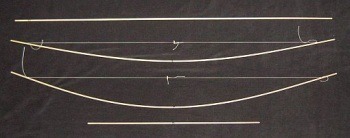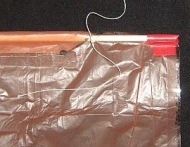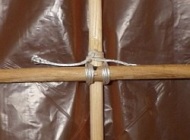- Home Page
- Better Kites
- ... Sode Kite
How to Make a Sode Kite
Step by Step—Page 2 of 4
The MBK Dowel Sode
How to Make a Sode Kite
Spars
For this sode, you need long lengths of 5 mm (3/16 in.) wooden dowel, enough for the upper and lower horizontal spars of 1.0 DL (120 cm, 48 in.) each, the 0.96 DL (115.2 cm, 46 in.) vertical spar, and the 0.5 DL (60 cm, 24 in.) bottom spar. They are easily cut to the lengths required with a small cheap hacksaw.

- Lay down a dowel over the center crease of the sail plastic, mark it at the exact height of the sail, and cut off at the mark. Include the length of those tabs on the bottom edge of the sail! Round off the tips with a wood file. This is the vertical spar.
- Cut off two very short 0.01 DL (1.2 cm, 1/2 in.) lengths of dowel. Round off the tips with a wood file. These will be used as the bow-line toggles. You can use thinner dowel for these if you have some lying around. I use 4 mm dowel for toggles.
- Lay down some more dowel across the width of the sail, mark it at the exact width, and cut off at the mark.
- Round off the tips with a wood file then add a bow line so the depth of the bow is 0.06 DL (7 cm, 3 in.). With the kite flat on the ground, that's how far the tips should be from the grass. This is the upper horizontal spar.
- While the glue is drying on the knots, do those previous two steps again to create another spar. However, the depth of the bow this time should be 0.1 DL (12 cm, 4 3/4 in.). Now you have made the lower horizontal spar.
- Finally, lay your remaining dowel across the bottom edge of the sail, mark, and cut off. This is the bottom horizontal spar, which should be about 0.5 DL (60 cm, 24 in.) long. Round the tips with your wood file. The photo shows all the spars with the horizontal-spar bow lines attached. See how the upper horizontal spar has less bow.
Note: You might find it handy to make a mark on both horizontal spars to quickly tell them apart when they are lying straight. For example, mark a U on the upper spar and an L on the lower spar.
How to Make a Sode Kite
Spar Caps
Prepare 11 lengths of electrical insulation tape, each one about four times longer than it is wide. Stick them by a corner onto something handy like a table edge. You can remove them one at a time as needed.

- Spread out the sail, with the edge tape facing upwards.
- Lay down the upper horizontal spar over the sail so it would bow away from the sail if you attached the toggle. With the toggle unattached, line up the tips of the spar with the upper corners of the sail.
- Cap one tip of the spar with tape by sticking tape down over the dowel and plastic then folding it around and under the plastic to stick on the other side—a bit tricky, so take your time!
- For added strength, put another piece of tape around the leading edge. The part of the first tape that was sticking out is now folded back under the leading edge by the second piece of tape.
- Now do the other tip of the spar similarly, using two more pieces of tape.
- See those tabs on the top edge of the sail? Fold them over the dowel, and run clear sticky tape along the entire length of the tabs to secure them. See the photo for a completed tip cap plus one end of a secured tab.
After the upper horizontal spar is all capped and wrapped, :-) do the same for the lower horizontal spar.
The bottom horizontal spar is very similar too, except that you can get away with only one piece of tape over each tip instead of two. With the tabs folded over, the vertical spar sticks out a little, but that is correct.
Finally, you should have one piece of tape left. Use it to cap the upper tip of the vertical spar, attaching it to the small triangular piece of sail.
How to Make a Sode Kite
Lashing the Spars

At all three crossing points, lash and glue the spars together, using short lengths of flying line. Fix each knot with a drop of glue so it can never come undone or shift along the vertical spar.
As mentioned earlier, there's more kite making on this site than you can poke a stick at. :-)
Want to know the most convenient way of using it all?
The Big MBK E-book Bundle is a collection of downloads—printable PDF files which provide step-by-step instructions for many kites large and small.
That's every kite in every MBK series.
